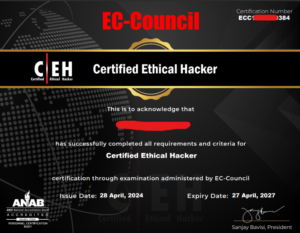Certified SOC Expert Certification
Become a Certified SOC Expert
Build your career in the field of cyber security with Globally recognised SOC Certification
- Gain cutting-edge ethical hacking skills to future-proof your tech career
- Ace the Ethical Hacking certification exam confidently on the first attempt
- Unlock high-paying career opportunities as a skilled Ethical Hacker
- Join elite cybersecurity professionals and master the art of ethical hacking

Learn more about the course
Get details on syllabus, projects, tools, and more
- Talk to Learning Advisor
Request a call back
SOC CERTIFICATION PRROGRAM OVERVIEW
Practical Based SOC Training
What is a SOC Expert?
A SOC (Security Operations Center) Expert is a professional responsible for monitoring, detecting, and responding to cybersecurity incidents within an organization. They work in a collaborative environment, using a combination of cutting-edge tools, processes, and techniques to protect an organization’s assets from various cyber threats. The role requires a deep understanding of cybersecurity principles, threat analysis, incident response, and continuous monitoring of security systems.
Why Become a Certified SOC Expert?
Becoming a Certified SOC Expert opens up numerous career opportunities in the cybersecurity field. With cyber threats becoming more sophisticated, organizations are increasingly looking for certified professionals who can provide reliable security solutions. The certification not only validates your skills but also demonstrates your commitment to staying ahead in the rapidly changing cybersecurity landscape.
Who Should Attend?
- IT Professionals looking to transition into cybersecurity roles.
- Cybersecurity Analysts seeking to enhance their skills and advance their careers.
- Network Administrators and System Administrators who want to gain a deeper understanding of security operations.
- Security Consultants aiming to broaden their expertise in SOC operations.
- Aspiring SOC Analysts who want to enter the field with a strong foundation.
Course Objectives
The Certified SOC Expert Training course is designed to provide participants with:
- A comprehensive understanding of the SOC environment and its importance in cybersecurity.
- In-depth knowledge of security information and event management (SIEM) tools.
- Expertise in identifying, analyzing, and responding to security incidents.
- Hands-on experience in threat detection, incident response, and security monitoring.
- Practical knowledge of various cybersecurity frameworks, standards, and best practices.
- The ability to conduct forensic investigations and root cause analysis of security incidents.
Key Topics Covered
Introduction to SOC:
- Understanding the role and structure of a Security Operations Center.
- The importance of SOC in modern organizations.
Threat Intelligence:
- Gathering and analyzing threat intelligence.
- Utilizing threat intelligence for proactive defense.
SIEM Tools:
- Introduction to Security Information and Event Management (SIEM) tools.
- Configuring and managing SIEM for effective security monitoring.
Incident Response:
- Developing and implementing incident response plans.
- Real-time monitoring and incident handling.
Security Monitoring:
- Continuous monitoring of network traffic and security events.
- Analyzing security logs and detecting anomalies.
Forensic Analysis:
- Conducting digital forensics to investigate security incidents.
- Techniques for evidence collection and analysis.
Compliance and Regulatory Requirements:
- Understanding various cybersecurity regulations and compliance standards.
- Implementing policies to meet regulatory requirements.
CAREER OPPORTUNITY
Certified SOC Training is Mapped to 20 Job Roles in Cyber Security
- Mid-Level Information Security Auditor
- Cybersecurity Auditors
- Security Administrator
- IT Security Administrators
- Cyber Defense Analysts
- Vulnerability Assessment Analysts
- Warning Analyst
- Security Analyst
- SOC Security Analyst
- Network Engineers
Certified SOC Training
The significance of cybersecurity has never been more pronounced. With cyber threats evolving rapidly, organizations worldwide are seeking skilled professionals to protect their sensitive data and networks. One of the most critical roles in this domain is that of a Security Operations Center (SOC) Expert. The Certified SOC Expert Training is designed to equip cybersecurity professionals with the skills and knowledge necessary to excel in this challenging and rewarding field.
Why Become a Certified SOC Expert?
Becoming a Certified SOC Expert opens up numerous career opportunities in the cybersecurity field. With cyber threats becoming more sophisticated, organizations are increasingly looking for certified professionals who can provide reliable security solutions. The certification not only validates your skills but also demonstrates your commitment to staying ahead in the rapidly changing cybersecurity landscape.
ABOUT US
Why Choose Digived Tech Academy
Placement and Internship assistance
learn from Industry expert
Practical training
Get Job Ready
Step by step guides and Question bank
Real Time Projects
CEH V12 COURSE CURRICULUM
Curriculum
This module sets the stage by introducing candidates to the world of ethical hacking. It covers the basics of information security, threat vectors, and attack surfaces. Candidates learn about the various phases of hacking, including reconnaissance, scanning, gaining access, maintaining access, and covering tracks.
Footprinting and reconnaissance involve gathering as much information as possible about the target system. This module teaches candidates various techniques and tools used to collect data, such as WHOIS lookup, DNS enumeration, and social engineering.
In this module, candidates learn to use scanning tools to identify open ports, services, and vulnerabilities in the target network. Techniques such as network scanning, vulnerability scanning, and penetration testing are explored in depth.
Enumeration involves extracting detailed information about the target system. This module covers techniques for enumerating users, groups, shares, and services. Candidates also learn about SNMP enumeration, LDAP enumeration, and NTP enumeration.
This module focuses on identifying vulnerabilities in the target systems. Candidates are trained to use various vulnerability assessment tools to detect potential weaknesses. The module also covers risk assessment and mitigation strategies.
This module sets the stage by introducing candidates to the world of ethical hacking. It covers the basics of information security, threat vectors, and attack surfaces. Candidates learn about the various phases of hacking, including reconnaissance, scanning, gaining access, maintaining access, and covering tracks.
Footprinting and reconnaissance involve gathering as much information as possible about the target system. This module teaches candidates various techniques and tools used to collect data, such as WHOIS lookup, DNS enumeration, and social engineering.
In this module, candidates learn to use scanning tools to identify open ports, services, and vulnerabilities in the target network. Techniques such as network scanning, vulnerability scanning, and penetration testing are explored in depth.
Enumeration involves extracting detailed information about the target system. This module covers techniques for enumerating users, groups, shares, and services. Candidates also learn about SNMP enumeration, LDAP enumeration, and NTP enumeration.
This module focuses on identifying vulnerabilities in the target systems. Candidates are trained to use various vulnerability assessment tools to detect potential weaknesses. The module also covers risk assessment and mitigation strategies.
This module focuses on identifying vulnerabilities in the target systems. Candidates are trained to use various vulnerability assessment tools to detect potential weaknesses. The module also covers risk assessment and mitigation strategies.
This module focuses on identifying vulnerabilities in the target systems. Candidates are trained to use various vulnerability assessment tools to detect potential weaknesses. The module also covers risk assessment and mitigation strategies.
This module focuses on identifying vulnerabilities in the target systems. Candidates are trained to use various vulnerability assessment tools to detect potential weaknesses. The module also covers risk assessment and mitigation strategies.
This module focuses on identifying vulnerabilities in the target systems. Candidates are trained to use various vulnerability assessment tools to detect potential weaknesses. The module also covers risk assessment and mitigation strategies.
This module focuses on identifying vulnerabilities in the target systems. Candidates are trained to use various vulnerability assessment tools to detect potential weaknesses. The module also covers risk assessment and mitigation strategies.
This module focuses on identifying vulnerabilities in the target systems. Candidates are trained to use various vulnerability assessment tools to detect potential weaknesses. The module also covers risk assessment and mitigation strategies.
MENTORS & TRAINERS
Our Course Advisory

Sanjoy Kumar
Program Director
I found the experience both exhilarating and challenging. The course provided a deep dive into cybersecurity concepts, from understanding vulnerabilities to practical skills like penetration testing and secure coding practices. What I appreciated most was the hands-on approach; we had access to virtual labs where we could apply theoretical knowledge in real-time scenarios. This practical aspect not only solidified my understanding but also boosted my confidence in tackling cybersecurity challenges.
LEARNINING OBJECTIVES
Skills Covered
WHO CAN TAKE THIS COURSE
Get Certified with SOC Training led Instriuctors
The Certified SOC Expert (CSOE) certification from EC-Council ensures industry credibility and acceptance, providing a robust foundation for your career advancement in security operations.

About SOC Certification
SOC Certification validates your skills in managing and operating Security Operations Centers, focusing on threat detection, incident response, and security monitoring.
It enhances your credibility and career prospects in cybersecurity by proving your expertise in SOC operations.
IT professionals, cybersecurity analysts, network administrators, and those aiming for SOC roles.
Training includes SOC fundamentals, threat intelligence, SIEM tools, incident response, and security monitoring.
The exam features multiple-choice questions, scenario-based questions, and practical exercises.
Enroll in a SOC Certification course, use study guides, practice exams, and engage in hands-on labs.
Training duration varies: instructor-led courses take days to weeks, while self-paced options may take longer.
Certification boosts your industry credibility, career opportunities, and validates your SOC expertise.
Course fees and Training
Options
Live online Classroom
Learn In Expert-Led Live Sessions
What all includes in this?
- 70 hours of Live Interactive Training
- all tools and Techniques
- CEHv 12 Examination voucher
- Training Simulation labs
45,000/- + GST
*Flexible EMI Options Available
Enterprise and University
Upskill and Reskill Your Teams
What all includes in this?
- Customized Corporate Training
- Unleash In-Demand Skills Across the Enterprise
- Align Skill Development with Business Objectives
- Leverage Immersive Learning
WHO CAN TAKE THIS COURSE
Prerequisites and Eligibility
- An understanding of Ethical Hacking concepts is beneficial
- Previous IT experience can be advantageous
- Prior programming experience can be helpful
- None of the above are mandatory to attend the course

Who can take this course
- Students
- Graduates
- Cybersecurity Enthusiasts
- IT Professionals
- Security Officers
- Network Administrators
- Network Administrators
- Penetration Testers
- Ethical Hackers
- Anyone Interested
SOC Certification Course: FAQs
The course covers SOC fundamentals, threat intelligence, SIEM tools, incident response, security monitoring, and forensic analysis.
IT professionals, cybersecurity analysts, network and system administrators, and individuals aspiring to work in or advance within a SOC.
Courses may be instructor-led (in-person or online), self-paced online, or blended learning, depending on the provider.
Duration varies: instructor-led courses typically last a few days to weeks, while self-paced options can take longer.
Basic knowledge of IT and cybersecurity concepts is usually recommended but not always required.
Assessment includes exams, practical exercises, and hands-on labs to test your knowledge and skills.
It enhances your credibility, opens up advanced job opportunities in cybersecurity, and validates your expertise in SOC operations.
Visit the training provider’s website, select your preferred course format, register online, and complete payment.
Yes, most courses provide study materials, including textbooks, online resources, and access to practice exams.
Ensure the course is provided by a recognized and accredited organization. Verify the credentials of the training provider to ensure they meet industry standards.
